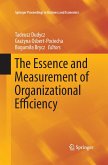This book presents the latest in decision-making tools, techniques, and solutions for policy makers to utilize in overcoming the challenges faced by healthcare systems. With contributions from experts world-wide, an array of healthcare management models, techniques, and integrative solutions are presented, drawing on econometric, system dynamics, and agent-based models as well as state-of-the-art empirical studies. As total healthcare spending (both total expenditures on health as a percentage of GDP and average spending on per capita) increases across most of the world's economies, healthcare systems continue to face challenges in terms of cost, quality, and access, as a result of its fragmented nature. Consequently, healthcare managers and policy makers require innovative integrative approaches and solutions to better manage complex, dynamic healthcare systems.
This volume offers researchers and policy makers an insightful and critical review of the state of the art in healthcare modeling, with a particular focus on system dynamics, agent-based models, and modern empirical studies. It will be of interest to those in the fields of health, business management, and information systems.
This volume offers researchers and policy makers an insightful and critical review of the state of the art in healthcare modeling, with a particular focus on system dynamics, agent-based models, and modern empirical studies. It will be of interest to those in the fields of health, business management, and information systems.








